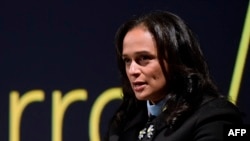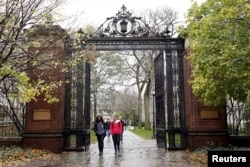On April 13, Isabel dos Santos, Africa’s richest woman, is scheduled to speak at a student-led event at Yale University. Dos Santos is the former chairwoman of Sonangol, Angola’s state-owned oil company, and the daughter of former President Jose Eduardo dos Santos.
She also has been accused of corruption and graft. In 2015, Transparency International, a global monitoring group, identified dos Santos as a “prime example” of grand corruption. Last month, Sonangol’s new chairman suggested that dos Santos improperly moved millions of dollars from the company in the days following her dismissal.
Peace and development
Last fall, the Yale Undergraduate Association for African Peace and Development (YAAPD) invited dos Santos to its annual conference on peace and development in Africa and the global African diaspora.
In a tweet in March, YAAPD wrote, “We are so excited to announce another keynote speaker for our conference April 13th: ISABEL DOS SANTOS! Dos Santos is an Angolan businesswoman, entrepreneur and Africa’s richest woman.”
Now in its fifth year, The Yale Conference for African Peace and Development is the signature event for the YAAPD.
In addition to dos Santos, 13 panelists will speak on the themes of identity, democracy, business and technology, and sustainability. Pastor Evan Mawarire, a Zimbabwean religious leader, is the second keynote speaker.
Political ties
Justin Pearce is a lecturer in the Department of Politics and International Studies at the University of Cambridge and an expert on Angola.
The problem with YAAPD’s speaker selection, he said, is that everyday Angolans are acutely aware that the wealth of the dos Santos family, and especially Isabel, came from political connections, not entrepreneurship.
“She said that she’d started out as an entrepreneur as a little girl selling eggs on the streets of Luanda. But you can be sure, given the background that she came from, it’s not like she had to sell eggs to put food on the table,” Pearce told VOA.
“Whether that little anecdote is true or not, the fact remains that she wouldn’t have acquired her financial assets and the businesses that she controls without the influence of her father,” he added.
Accusations of graft
In a 2017 interview with the Reuters news agency, dos Santos said, “My parents formed who I am as a person. But my professional choices and the risks I have taken and the businesses I have built and created were done by my own vision and by my own will.”
Beyond questions about whether she is self-made, dos Santos also has been accused of pilfering from state coffers.
In September, Joao Lourenco replaced long-time leader Jose Eduardo dos Santos, giving Angola its first new president in 38 years. Dos Santos did not run for re-election, but he retains considerable power as the chairman of the People’s Movement for the Liberation of Angola, the ruling party.
Shortly after his swearing in, Lourenco removed Isabel dos Santos from the helm of Sonangol and appointed Carlos Saturnino in her place.
In early March, Saturnino raised questions about a $38 million payment to a company based in Dubai that dos Santos approved after she had been dismissed as chair and before Saturnino stepped in.
Isabel dos Santos called any suggestions of impropriety “slanderous,” but similar allegations have been made by prominent Angolan journalist Rafael Marques de Morais.
Engaging diverse perspectives
The YAAPD’s invitation drew pointed questions on social media from alumni, including Dayo Olopade, a Nigerian-American author. “Compared with the other named speakers, her biography speaks volumes. She is not an entrepreneur. She is not an activist. She is not an academic. She is not a role model,” Olopade wrote on Twitter.
In a written statement on March 28, the YAAPD said, “We certainly understand and acknowledge the concerns about Ms. Isabel Dos Santos’ presence and we extend an invitation for all parties to attend the event and relay their comments directly to her.”
That opportunity will come April 13 in the form of a 30-minute question-and-answer session on the Yale University campus in New Haven, Connecticut, following a speech by dos Santos and a 20-minute conversation with Eddie Mandhry, the director for Africa in the Yale Office of International Affairs.
Financial ties?
The YAAPD board added dos Santos to a short list of potential keynote speakers, and it voted to invite her after conducting research and conferring with other institutions at which she had spoken.
In its statement, the YAAPD made clear that dos Santos is not a sponsor of the event, nor will she receive an honorarium.
Among the 13 sponsors, however, one of the few not directly affiliated with Yale is the Boston Consulting Group (BCG), a global management consulting firm.
Dos Santos hired BCG in 2016 to assist with the transition at Sonangol when she stepped in as its chief executive.
YAAPD’s efforts
YAAPD is led by Yale students with deep ties to Africa, including students from Ghana, Nigeria, Senegal, South Africa and Zimbabwe. Through its annual conference, the YAAPD hopes to “put diverse people in conversation about issues that they are working on,” according to the group’s website.
“It’s good that the students in the United States are doing something to educate themselves and educate one another about African initiatives. And clearly Africa often gets stereotyped in the U.S., and it’s good to be breaking down those stereotypes,” Pearce said.
There are many African business people who started with nothing and would be inspirational speakers for students in the United States, according to Pearce.
“Unfortunately, Isabel dos Santos is not a good example of this,” he added. “She’s clearly somebody who’s become wealthy because of her political connections. And while she has a right to speak wherever she wants to, as somebody to put on a stage as a role model, I wouldn’t say she’s the most suitable choice.”
Dos Santos’ talk at Yale will not be her first appearance at a well-known school. She has previously spoken at the London Business School’s “LBS Africa Business Summit 2017” and the London School of Economics and Political Science’s “LSE Africa Summit 2017.”
VOA contacted the YAAPD for an interview, but it was unable to schedule one ahead of the two-day conference.






